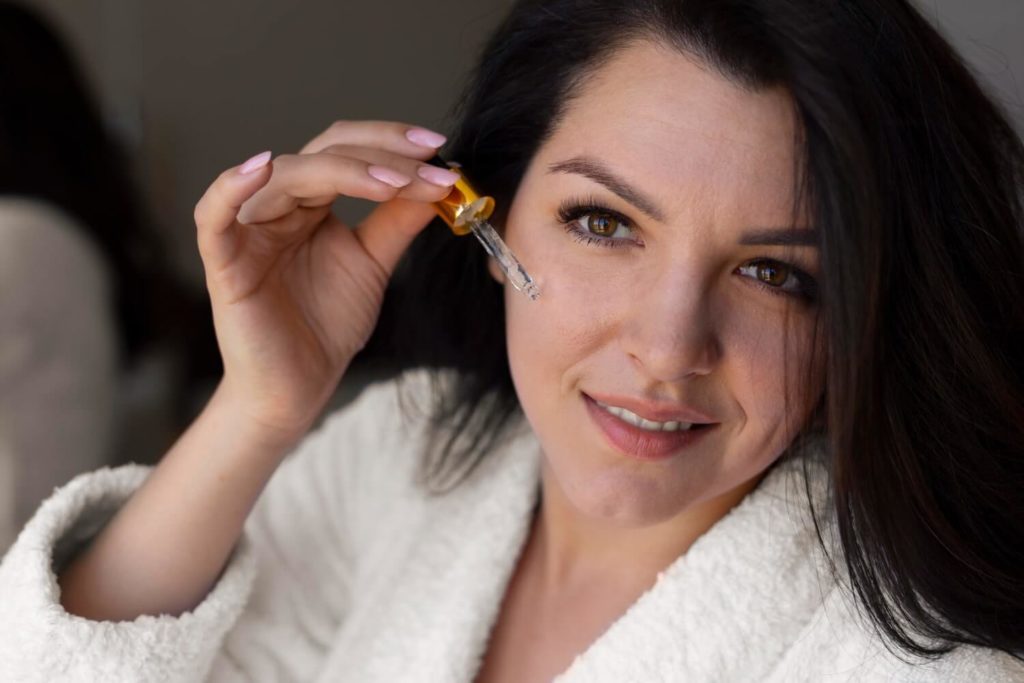If you’re interested in skincare, you’ve definitely heard about Vitamin B3 on Skin or Niacinamide’s multi-action power for face and skin troubles like acne. We’re breaking down the benefits of Niacinamide to learn why it’s your all-in-one skincare solution!
Niacinamide, also known as vitamin B3 or nicotinamide, has several skin benefits, making it a versatile and effective option for many people. We’ll look at why niacinamide serum was a skincare hype in 2022 and why it’s still popular today.
What does Niacinamide on Skin Do?
The usage of Vitamin B3 on Skin whitening is one of the reasons for its increased popularity.
And it is effective! Niacinamide might help you achieve an even skin tone by reducing skin patches and dark spots. At the same time, it increases skin moisture, giving it a long-lasting radiance. Overall, these findings are supported by science and data, and they can help you achieve brighter, more radiant skin.
Niacinamide, commonly known as vitamin B3 or nicotinamide, is occasionally advertised for its capacity to aid in skin whitening, particularly the decrease of hyperpigmentation and dark spots. While niacinamide is not a skin-bleaching agent like other substances (such as hydroquinone), it can help with acne.
Benefits of Niacinamide in Skin-Lightening?
It can diminish pigmentation, and even skin tone, have anti-inflammatory characteristics, and lessen the appearance of redness and blotchiness.

It’s worth noting that the outcomes of using niacinamide for skin lightening may not be as spectacular or as quick as those of other skin-lightening substances, such as hydroquinone.
Vitamin B3 on Skin is frequently regarded as a gentler and more progressive method of improving skin tone and removing hyperpigmentation.
How to use Vitamin B3 on Skin?
While Niacinamide can be used for skin advantages both orally and topically, topical use via Niacinamide serum is far more convenient and beneficial for the skin. Here’s how to use Vitamin B3 on Skin according to dermatologists for the finest skin results.
Step 1: Cleanse your face with a cleanser or a face wash.
Step 2: On your face, apply 2 drops of Niacinamide serum.
Step 3: Gently massage it into your skin until it is completely absorbed.
Step 4: For best results, use every day (morning and night).
Keep in mind that everyone’s skin is different, so choosing products that are appropriate for your specific needs is critical. If you have any adverse reactions or questions about using vitamin B3 serum, make sure to consult your skin conditions with your dermatologist.
Is Niacinamide Compatible With Other Active Ingredients?
A little-known fact is that most skincare products are more effective when combined with other components. Concerning pigmentation, nicotinamide works best when combined with other nutrients including hydroquinone, kojic acid, arbutin, and soy, which can function synergistically on the ‘pigment pathway’ to help erase brown spots and discoloration.
Nicotinamide vs. Nicotinic Acid
However, there is one widespread misunderstanding about B3 and its (many) monikers: Nicotinamide is an amide (a unique chemical structure) derivative of B3. It’s not niacin, the vitamin’s acid form. Niacin is considerably more widely available at the pharmacy, however, it occasionally causes flushing, which nicotinamide does not. Not a fan of the red face? Check your ingredient listings carefully, and don’t assume that because “-amide” is missing, the item is still the same.
Are there any Side Effects of Vitamin B3?
Niacinamide, like ceramides, helps to hydrate the skin. Niacinamide is an effective component for skin moisturization as well as skin brightening and their are many Niacinamide benefits for your skin. However, it may irritate the skin when used at high doses in a cosmetics formulation. As a result, it is advised to utilize low amounts of vitamin B3 (1-2 percent) in a formulation.
Niacinamide on Skin FAQ-
Can Vitamin B3 address common skin concerns?
Yes, Vitamin B3 is known for its versatility in addressing various skin concerns. It has been shown to reduce the appearance of fine lines and wrinkles, minimize pores, and alleviate conditions such as acne and rosacea. Its anti-inflammatory properties make it a valuable asset in skincare routines.
How does Vitamin B3 contribute to a youthful complexion?
Vitamin B3 supports the skin's natural production of ceramides and fatty acids, crucial components for maintaining a youthful appearance. By boosting collagen synthesis, it helps improve skin elasticity, reducing the visible signs of aging and promoting a smoother skin texture.
Is Vitamin B3 suitable for all skin types?
Yes, Vitamin B3 is generally well-tolerated by all skin types, including sensitive skin. It is non-irritating and works effectively without causing dryness or redness. Its calming properties make it suitable for individuals with various skin sensitivities.
How can Vitamin B3 be incorporated into a skincare routine?
Vitamin B3 can be easily incorporated into a skincare routine through the use of niacinamide-containing products such as serums, creams, or moisturizers. Applying these products regularly, either in the morning or evening, can help maximize the benefits of Vitamin B3 for the skin. However, it's advisable to start with a patch test to ensure compatibility with individual skin types.


Pingback: Viral Skincare Combos You Shouldn’t Miss This Season - Wild Oak Skincare
Pingback: Top 4 Benefits of Ceramides in Skincare: Benefits,Usage- Wild Oak